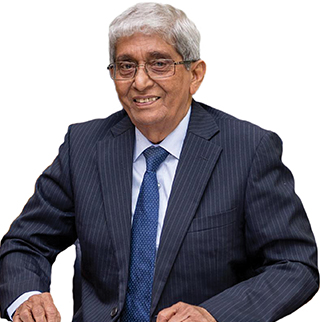WD Lakshman, governor of the Central Bank of Sri Lanka, was appointed to the position in December 2019, following a long career in academia. He talks to Kimberley Long about how he will bring his experience to the role.
Q: Sri Lanka has seen its economy slow down, and you have called for stringent measures to restart growth. What measures do you believe need to be taken?
A: Before the presidential election was held in November 2019, the country looked in bad shape. There is a lot of expectation for reform now president Gotabaya Rajapaksa is in power. It has had an impact on confidence and is being seen as the start of a new era. I said myself it would be the start of a period of development, the likes of which we had not seen for decades.
There are still blocks to overcome, as the government lacks a majority in parliament. Earlier proposals from the president have received approval but have not been implemented.
Further problems are being seen through the impact of the coronavirus [crisis]. There has been an impact on Sri Lanka’s tourism sector. Other sectors, such as construction, have also been hit as many [of our infrastructure projects] are Chinese-funded and use Chinese labourers. It is difficult to be confident about the economy in this situation.
We still have confidence that the parliamentary elections later in 2020 will bring about change. With a majority, the government would be able to implement more business support and tax benefits. Big business sectors are waiting to see the results of the parliamentary elections before implementing changes.
Q: Digital banking is a growing trend in Sri Lanka. What are the central bank’s views on these developments?
A: The development of banking technology needs to find solutions that work for all sectors of society. I have expressed my feeling that there is a strong need for the legacy banking sector to align with what is being developed digitally.
I have a background in academia and [was appointed as] central bank governor in December 2019. I have come to this position with strong opinions. I do not think the banking sector should prioritise developing digital offerings. It is the role of the smaller technology sector to develop this technology.
People in rural areas are not well educated in financial literacy. Whatever is happening in discussions regarding digital banking must include their needs. The largest banks still account for about 80% of total deposits in Sri Lanka; and banking is widely done in branches. For the rural communities, branches are still needed. Foreign banks [have helped to enhance the] reputation of Sri Lanka’s banking system, but they are not doing business with the ordinary population. At present they account for only about 3% of all deposits.
Q: There are calls for bank consolidation. Is this something you are looking at?
A: Consolidation is an option in some cases, but not for more than three or four banks. I believe it is required more for the non-bank financial institutions. We have been talking to trade unions in the banking sector for their views on consolidation. There are only a few banks ever mentioned in the discussion. The central bank will be at the core of the decision on which banks will consolidate.
Q: Non-performing loans [NPLs] are fairly high in Sri Lanka. Are they presenting a problem?
A: NPLs are a problem. This is not because of the small loan defaults, but because of the bigger loans that are taken with no intention of repaying them. The laws need to be changed in order to prevent this kind of behaviour.
Overall, the small-value NPLs are predominant. About 5% of all loans issued are classified as NPLs at this time. This is not too much of a concern and can be managed.
The problems we are likely to see now are linked to the banks not lending enough. Despite steps from the government, more work has to be done. There are hopes that lending will start moving again when there are changes in parliament.
Q: What are you hoping to achieve in your time as central bank governor?
A: We have to get the country to a place that promotes growth and remains steady. Stable and steady economic growth is the goal.
The central bank is talking more to the government and the Ministry of Finance. We want to make it less of an ‘us and them’ approach to developing financial solutions. We want to have a greater degree of collaboration with the government. This will help with the development of what is being greenlit and put into policy.



